In this article, we will discuss the concepts of civilization and culture to help us understand how the development of ancient civilizations took place throughout history.
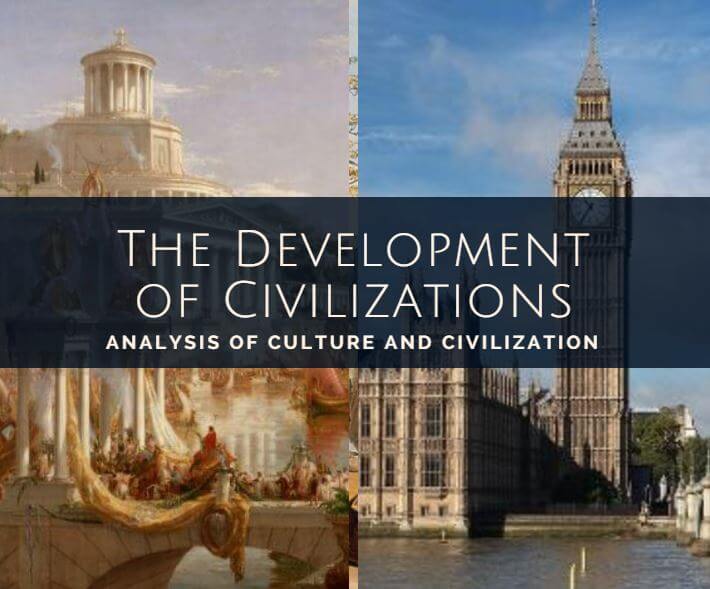
Civilization and Culture
Contents
The Concept of Civilization
Etymologically, the term civilization comes from the Latin civis, citizen, vocabulary which alludes to and designates an inhabitant of a city, in contrast to the inhabitants of the fields, denominated rural. But in the Roman right, the name citizen is broadened (in the year 212 AD) to all the inhabitants of the Empire, including the provinces, without distinguishing between those in the country and those in the city. In spite of this legal definition, the inhabitants of the city and those of the country are differentiated by their customs, level of education, virtues, etc., with gradations also existing among the first, according to their social or economic status, etc. Slaves and free men without the status of a citizen are excluded from the right of citizenship. Those who received the right of citizenship were called citizens and enjoyed public rights and those of the civil law.
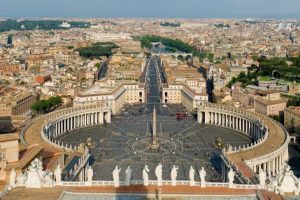
The existence of the citizen supposes, certainly, that of the city, civitas in Latin. The civilitas, equivalent to urbanites, is interpreted as the way of being typical of the city and its inhabitants, in accordance with its norms.
From civilitas the Italian word “civiltà” is derived, with the same meaning as the English word “civilization” and in spite of the various meanings of this word, almost all coincide in their reference to the city. For a very long time, from the 17th Century, the adjective civilized was synonymous with refined, informed, educated. In this sense, the French and English adjectives poli and polished are used, respectively, derived in their turn from the Greek polis (city). With a meaning of sociable, courteous, thoughtful, the Spanish word “civil” is used, proceeding from the Latin civilis. The terms civility and courtesy have a meaning similar to sociability or urbanity.
The French were the first in employing the term civilization, derived from the verb civilize (civileser), in the sense of material, intellectual or social progress, etc. Voltaire was the one who, in The Age of Louis XIV (1751), referred before anyone else to a civilization of the time. Condorcet, in 1787, alludes to civilization as the remedy for war, slavery and misery. These and other authors speak of civilization as the furthest opposite of barbarity, a concept which acquires great esteem all the way up to the end of the 18th Century. Marx and Engels, in their Manifesto of the Communist Party (1848) understand civilization as means of subsistence. By the 20th Century, Ferdinand Tönnies and Alfred Weber encompass within the term civilization all the means which permit man to work over nature.
It is not possible to pretend to give one definition of civilization which brings in all the common elements contained in the distinct concepts of civilization. The anthropologists A.L. Kroeber and Clyde Klukhohn enumerate 161 definitions. Philip Bagby, who has dedicated himself to cultural anthropology, proposes reserving the term civilization for that related to cities, as opposed to culture as typical of non-urbanized country, such that civilization comes to be a superior culture. It is very important to take this opinion into account because it has been said before about the etymological meaning.
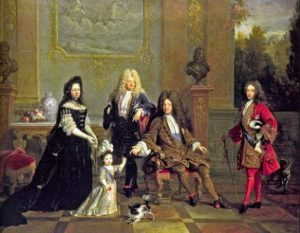
In general terms civilization can be understood, in a broad sense, as the extensive manifestation of human activity, considered collectively. For E. Weber, civilization is equivalent to material culture or the set of material and external means that man uses. Most authors who have studied the phenomenon of civilization share this state of mind, which tends to use the term culture to refer to the most intimate and vital realizations of human progress and the term civilization to refer to the most technical and exterior aspects. It is also common to consider civilization as the ultimate phase of the cultural process, in such a way that it always ends in civilization.
In this way, every cultural process leads to a culture, and by relation between cultures, a civilization is born. Such is the case of Western civilization, result of the cultures of the western peoples, its most external and technical manifestation. Even now, it is not possible to speak of a universal civilization, because on a global scale, all the cultures of all the peoples of the East and the West have not reached this result. But the connection and dependence of civilizations is continually larger, because of the influence of means of communication, by more intensive contact on the individual level, etc.
The Concept of Culture
The sense which is normally given to the word culture today retains very little relation to its etymology. Coming from the Latin verb colere (to cultivate), in the Roman world the word culture was used for farming work, that is to say, equivalent to the current English term for agriculture. By the similarity between the care which had to be taken with the land (plowing, reaping, sowing, etc.) and with man to achieve his intellectual formation, in the Modern Age the word culture began to be used in the intellectual sense in which we think of it today. And in the same way that one speaks of the cultivation of the mental faculties, it is said also of the cultivation of the spirit, of religious culture, etc., a cultured man being understood as a man integrally formed, even though in practice this adjective is applied to those who possess broad humanistic knowledge.
The Merriam-Webster Dictionary defines culture as the “the act of developing the intellectual and moral faculties especially by education”. In this sense, and in contrast to the more collective term civilization, culture refers more directly and properly to the individual. Christopher Dawson has elaborated a more broad and distinct concept, but also refering to the individual, on observing that the biological and intellectual elements cooperate in the formation of culture. Taking this into account, he defines culture saying it is, “a common way of life, it is the particular adaptation of man to his natural environment and to his economic necessities” (Dynamics of World History). This author names the same factors which intervene in culture: generic (population), geographic (place) and economic (work), as those which shape the animal species. To these factors, we should add psychology, typical of human species, which frees man from blind dependence on the environment.
For Dawson, language is a fundamental element of culture, that which distinguishes man from the irrational animals, that which differentiates one culture from another. “The linguistic factor is, in a certain sense, the most important, given that language is the psychological means by which the remaining elements are valued and through which they acquire form and continuity”.
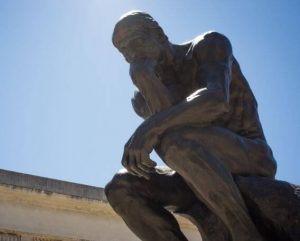
When Dawson affirms that the intellectual element is, “the soul and the primary formative of culture” he coincides with an already generalized concept of culture; but at the same time that culture is considered as the manifestation of the life of the spirit, he does not lose sight of the part which consists of the response of biological life to conditions of the environment. This aspect is worth keeping in mind, if one wants to elaborate a broad concept of culture, applicable to whatever state of the life of man. Thus it occurs with cultures called primitive, more related to the earth and to the social than to the intellect. In synthesis, Dawson comes to a broad concept of culture particularly interesting from the sociological point of view: “In reality, culture is neither a purely physical process nor an ideal formation. It is a living collection that has its roots in the earth and in the simple and instinctive life of the shepherd, the fisher and the farmer no less than in the higher achievements of the artist and the philosopher; in the same way that the individual human combines, in the substantial unity of his personality, the life of nutrition and reproduction with the higher activities of reason and the intellect”. This is, moreover, a qualitative and not quantitative concept of culture. It does not measure culture by the amount of knowledge, but by man and his circumstances. Such an anthropological and ecological concept distances itself somewhat from the traditional concept of culture referred almost exclusively to the superior faculties of man, which people commonly translate in quantitative terms but are only different manifestations of culture.
The relation of a human group with its environment and its functions determines the character of a culture, the object of study on the part of anthropologists and sociologists. Hence in Anthropology, we speak of material culture, relating this intimately with the soil and understanding it as a synonym of civilization. It was in Germany that the term culture (Kultur) has first been used as a synonym of civilization. However, J. G. Herder considers culture as intellectual and scientific progress, separate from any sociological context.
History of Civilization
If we start with the idea that civilization is the result and the most external manifestation of culture, we formulate a dynamic concept and therefore the object of History. Effectively, when the concept of civilization was incorporated to History in the 19th Century, new forms of History arouse such as History of civilization, object and subject at the same time of the same recounting. Until then, only sociologists and philosophers had occupied themselves with civilization in itself. The birth of Comparative History is a consequence of the broadening of the historical field of investigation, in whose framework civilizations are the object of study and analysis. Stripping these of their accessories, and integrating them in their common elements, is a historiographical desire which has produced a synthesis of civilization and has permitted the elaboration of the concepts of European or Western Civilization, and others.
When we talk about European civilization in Africa or in America, we are referring to a dynamic of projection. Certainly, it is the culture, although not only this, which is projected or is tried to be projected but the act of projection and its result are civilization. In the act of projection are included elements which are not properly cultural, vital, profound; but technical (means of transport, exploitation of minerals), economic (currency, commerce), social, etc.
In this display or projection of the culture a multitude of factors intervene: demographic, since a nation growing numerically may tend to expand its territory or give rise the phenomenon of migration; economic, like the search for new markets or sources of prime materials; ideological or philosophical, by the desire to expand the knowledge of life itself, et cetera. Religious factors have played an important role as they have specifically highlighted the fundamental unity of humankind. In the history of civilization, globally considered in its occurrence, the missionary zeal of the Church has made sense of and spiritualized a deep civilizing activity condemned by other means to failure. And this because even when civilization is a collective and institutional act (transplant of institutions) it is exercised over man in his physical and spiritual double dimension, this more permanent and decisive. The scientific and technical motivations constitute more accurately a vehicle for civilization and have contributed to accelerating the civilizing process beginning in the 16th Century. With respect to political motivations, considerable psychological and sociological factors are involved.
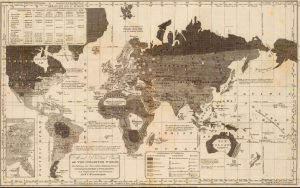
Trying to trace a picture here, even if it were shallow, of the history of human civilization, is an illusory task. Even more so because the history or civilization is not a linear history, and it is even debatable whether it is one single history or reducible to unity. What the panorama of real history offers us is more that of a multiplicity of lines which intersect, in which some die or are extinguished without leaving continuity (think, for example, of the ancient Egyptian or Mayan culture), others triumph incorporating elements of prior or neighboring cultures, but letting fall others, which are lost, etc. In the 19th Century, under the Hegelian influence, various precise syntheses were attempted: all have been abandoned, as their tendency to resolve matters quickly was clear. Contemporary authors have in this sense a more critical mentality and are more conscious of the inability of history to be grasped by man.
Principles and elements of Civilization
What are the forces that drive culture to civilization? We should answer referring to only one: the human spirit, the man insofar as it is shown, called to a perfection in which are displayed his native possibilities and capable of dominating the environment or the world around him, ordering it to his spiritual ends. But, starting with this general statement, we can attempt to specify something more, indicating some of the dimensions of the human dynamic which are in the root of the civilizing process.
A primary element which can be mentioned is the tendency that man shows in himself to channel the instinctive. Man participates in the biological and animal, which are a force present in him, but he knows at the same time -and in it is derived his spirituality- that this instinctive force is not discernment in itself, but should be ordered to the realization of the values which his intelligence lets him perceive and towards which he recognizes he should orient his willful decision. Culture appears thus as the integration of the person, which takes on and unifies all the native forces in turn to a spiritual unity.
From this perspective, it has been said that one of the goals achieved by civilization is the subordination of sensuality to reason. Subordination which -it is important to warn this- is not annihilation nor destruction, but harmonious reconciliation. We see thus the value and at the same time the risk of civilization, if it degenerates into an affirmation of an empty intellectualism, unaware of imaginative creativity, of excitement, etc. Authentic civilization, in contrast, rises when, the spirit asserted, the totality of living is ordered according to it, with all that is entailed of friendship, love, play, passion, etc. But if a poorly understood intellectualism should be denounced, it should be made absolutely clear at the same time that civilization depends, at its most basic roots, on human intelligence, as the faculty capable of opening man to being and to values. In the decline of some civilizations (the ancient Romans, for example) we see the effects of liberation without control of the instincts, in the same way that current Western civilization in evolution finds itself in a struggle between liberalization and repression, thus far without having been able to find the right balance, which has permitted a greater continuity and the settlement of the eastern civilizations. The spiritual and religious values, which part of the West renounces for the influence of atheist materialism, by reaction against forms of gentrification of the spirit, are those which have given support and firmness to ancient civilizations, those which have internally liberated the individual even in an oppressive society.
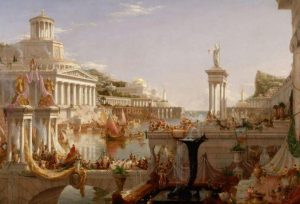
It is obvious on the other hand that when a civilization instead of ordering the passionate life to the service of ideals and values becomes merely coercive and repressive, that is to say, when man does not elevate man but cancels individual spontaneity, when the society decays into a system of social controls which drown individual liberty, when this becomes the object of mental alienation, the civilization at whose heart these circumstances are produced finds itself in crisis, announces its own extinction and, at the end fails to complete its essential mission as an instrument in the service of man, for man. This is the case of ancient civilizations, gone since the moment in which they stopped offering a service and replaced by others which contributed new energy, values, and ideas, realizations, in summary, which some historians explain as a process of cultural diffusion.
Another principle which explains the process of the emergence and development of civilizations is the human effort to overcome necessity or, in more general terms, the limits of the material, technical, or economic order that he can experience. The work of individuals is one of the fundamentals of civilization. This rises, in part, when man attempts to defeat difficulties, dominate nature, extend his dominion and broaden his areas of influence. Civilization is progress in the work that is produced, by human motives, to continually better and more fully satisfy the necessities of life. But it is important to underline that this civilizing aspect of work appears with much more force when the primary state of satisfying immediate necessities has been overcome. It is therefore when work is revealed in all its reach of expression of human creativity, giving rise to art, elegance in dress, the appeal of that which is apparently useless, etc. There is in this the danger that man may lose himself in the superfluous, denounced by moralists since the beginning and in modern times by sociological studies regarding consumer societies; but it is only a deviation of something which is in itself positive: human spirituality and his capacity for expression.
Civilization can, from this perspective, be defined as power over Nature, domination of physical means, ordering it to the moral values which sustain the life of man.

We shall mention a third principle: human communicability. Man relates to other not only to satisfy his individual needs but brought by a desire for communication. Man aspires to enter into relationships with other beings, to communicate to them his experiences and feelings, to find in love, in friendship, in mutual understanding his most complete realization. And this shows anew the enormous importance that spiritual values have in the cultural process. When a society, even if its technical standard be very high, decays into a society of masses, devoid of authentic participation, or into a repressive society in which fear of punishment is the most decisive determinant of human behavior, a factor of inhibition, which annuls the will, alienates the mind and converts individuals into passive instruments of the civilization, driven by the dominant, then the degree of civilization of these societies is minimal, even though they have materially progressed, because civilization is such only when it is accompanied by spiritual culture, that is to say, when material progress is at the service of the participation of all in an authentic human life.
Factors in the development of cultures
As we have already indicated in defining the concept of culture, this is a theme much studied by C. Dawson, which opposite the reductionism typical of positivism has been constantly occupied with defining how the material and spiritual factors are integrated into the process of cultural development. We will set forth then his ideas, citing almost an entire summary he himself made (Dynamics of World History).
Culture -he states- is a common system of life, a particular adaptation of man to his environment and his economic necessities. Just as much in its development as in its modifications, it resembles the evolution of biological species which owes fundamentally not to change of structure but to the formation of a community, whether with new customs or in a new and limited environment. And thus, just as each natural region tends to possess its characteristic forms of vegetable and animal life, it will also possess its own type of human society. This -he warns- does not mean that man is merely a plastic material submitted to the action of his environment, but on the contrary, man molds his environment. Because of this, it can be said that the more inferior a culture, the greater passivity it displays. The superior culture reveals itself through its domination of the material condition in which it is born and develops, showing itself as dominant and triumphal as an artist opposite the material with which he works.
From this perspective, it can be said that there are three presumed principal forces, like material condition, for the formation of a human culture. These are:
1. Race, that is to say, the genetic factor;
2. Environment, or geographic factor; and
3. Function or activity, in other words, the economic factor

But there also exists a fourth element, thought, or the psychological factor, whose presence liberates man from his blind dependence on the environment, characteristic of all the inferior forms of life. This factor is precisely that which makes possible the formation of an ever growing reserve of social traditions, in such a way that the things accomplished by one generation are transmitted to the next and the discoveries or new ideas of one individual become common property of the society, and it is that which gives rise to culture. The formation of a culture owes itself to the reciprocal action of all these factors; it is a quadruple community, as it contains in variable proportions communities of work and of thought, just as of place and of blood. Whoever tries to define social development using one of these to the exclusion of the others, will come to an error of racial, geographic or economic determinism, or a more or less false theory of abstract intellectual progress.
On this base, Dawson attempts to trace a picture of the lines of cultural development. Opposite the tendency to limit culture to immutable social types, he states that it is impossible to deny the existence and importance of cultural progress. But he adds that this progress is not, as the philosophers of the 18th Century believed, a uniform and continuous movement, common to the general race and as universal and necessary as the laws of nature, but that it is more an exceptional realization owing to a number of distinct causes which often act in a spasmodic and irregular way. Thus, as civilization in itself is not one whole, but the unification or integration of a number of historic cultures, progress is no more than the abstract idea with which we express, by means of a simplification, the multiple and heterogeneous changes undergone by societies throughout History.
Hence, instead of a uniform law of progress, it is necessary to distinguish various principal types of cultural evolution. Dawson specifically indicates five:
1. The simple case of a people who creates its own way of life in its original environment, without the intervention of human factors foreign to it. An example of this are the primitive “precultures” formed of races, which we have mentioned before.
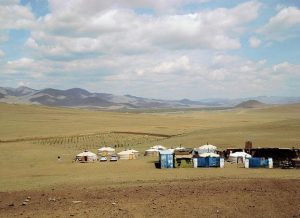
2. The case of a people which settles in a geographical environment new to it, and in consequence, has to adapt its culture to it. This is the most simple type of cultural evolution, but nevertheless, has great importance. There exists a constant process of the peoples of the Steppe who penetrate into the forest areas and vice-versa, mountainous peoples who descend to the plains and the people of the inland regions who come out to the sea. When the climatic differences between the two regions are very apparent (like the case of the invasion of India by the peoples of the Steppes and plateaus of central Asia), the results tend to be surprising.
3. The case of two different peoples, each one with its own way of life and social organization, which mix among themselves, usually as a consequence of a conquest and, occasionally, of a peaceful contact. Whatever the case, the factor indicated in the precedent case is also present here, at least referring to one of the peoples. For the others, this is the most typical and important case of the causes for cultural evolution, since in it there is an organic process of fusion and evolution which transforms the people just as much as the culture and gives origin to a new cultural entity in a comparatively short space of time. In fact, it constitutes the starting point of all the sudden flourishings of new civilizations which never cease to amaze us as something marvelous (example: the case of the Greeks). If we compare the diverse examples which from this process of fusion of peoples and cultures offer us the different ages in distinct parts of the earth, we always observe that the cycle of evolution passes through the same phases and lasts approximately the same time. First there is a time of several centuries of silent growth during which the nation lives according to the traditions of an anterior culture, whether it is the same one it has contributed, or that which it has found in the area where it was established. After this follows a period of intense cultural activity, in which new ways of life originated by the vital union of two different peoples and cultures suddenly flourish, and in which we see the awakening of forms of the old culture, fertilized by contact with a new people, or the creative activity of the new people stimulated by contact with the native culture. It is a period of great achievements, of exuberant vitality, but also of violent conflicts and revolts, of spasmodic action and of brilliant promises which never crystallize. Finally the culture reaches its maturity whether by the absorption of new elements on the part of the original people and culture, or by the reaching of a permanent equilibrium between both peoples, that is to say, the stabilization of a new cultural variant.
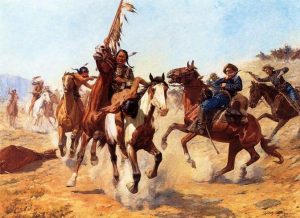
4. The case of the nation which adopts certain elements of material culture which have been created and developed by some other people. This change is comparatively superficial with respect to the anterior, but of great importance for demonstrating to what point reciprocal action is active between the two cultures. Thus, in the past, the use of metals, the practice of agriculture and of irrigation, the use of a new weapon or of the horse in war, are uses and techniques which extend themselves with extraordinary rapidity from one extreme to the other of the ancient world. Even more, such material changes brought with them profound social changes, as they even, on occasion, changed the entire system of social organization. In our time we have other examples, which go from the adoption of the horse by the Indians of the North American plains and the promotion of the use of firearms and of European dress among the primitive peoples, to the universal spread of industrial technology. It is fitting to observe that such external changes often drive not towards progress, but towards social decadence. The fact that every constructive change should proceed from the interior is a law whose realization is easily confirmed.
5. The case of the nation which changes its way of life because of the adoption of new knowledge and beliefs, or of certain changes in its interpretation of life and in its concept of reality. This case finishes underlining that the process of cultural evolution is not rigidly determinative, but instead depends on intellectual progress and free moral practice. Some historians and sociologists, of materialistic origin, speak as if the most prized products of a culture were the fruits of a social organism which strengthens its roots under geographic circumstances and particular ethnologies, as if the great works of thought and art were nothing more than the simple reproduction, in the most pedantic way, of the results of the past experiences of the organism. Certainly, it should be admitted that every previous condition influences the later manifestations of a culture and in the concept that it has of life, and that therefore, the cultural productions of a people turn out conditioned, in greater or less measure, by the past. But this is not produced in a mechanical way. The existence of reason adds to the number of possibilities towards the realization of the beginning purpose. An already experienced impulse that acts in an unprecedented environment, different from that of which it had been shown in a beginning can be not a decadent relic, but a cornerstone for the acquisition of new forces and for the formation of a renewed comprehension of reality. In consequence, a continuous expansion is produced in the field of experience and, by virtue of reason, the new does not simply replace the old, but it is compared and combined with it. The history of humanity -or better said, specifies Dawson, of civilized humanity- shows a continuous process of integration which, even though it sometimes appears to advance irregularly, never ceases in its movement.
In this process -indicates the English historian- on factor has special prominence: the religious. Religion implies, with special depth, an attitude towards life and a vision of reality; whatever modification which is added to this level brings with it a change in the general character of the culture, as can be proved in the case of of the transformation by Islamism of the pagan Arabic society, or in the transformation introduced by Christianity in the Greco-Roman world. From this perspective it can be said that the prophet and the religious reformer -in which appears in an explicit and deep way a religious deepening- are perhaps the most important agents of social evolution, and this even when they themselves may be the vehicle of an ancient tradition, in whose nucleus they penetrate with particular force.
In summarized accounts, the great phases of human culture are tied to the changes in the vision man has of reality. On the other hand, and keeping in mind that every civilizing undertaking implies in some degree a domination of the surrounding environment, it can be said that the great jumps which mark human history are taken when the conscience that man has of his being, of the reality of God, of the relation to Him, etc., are completed with the discovery of the laws of nature, or better with the possibility of a fruitful collaboration between man and the forces of nature. A phenomenon of this type is present in every cultural movement, even in the most primitive and, in a special way, in the superior cultures.
